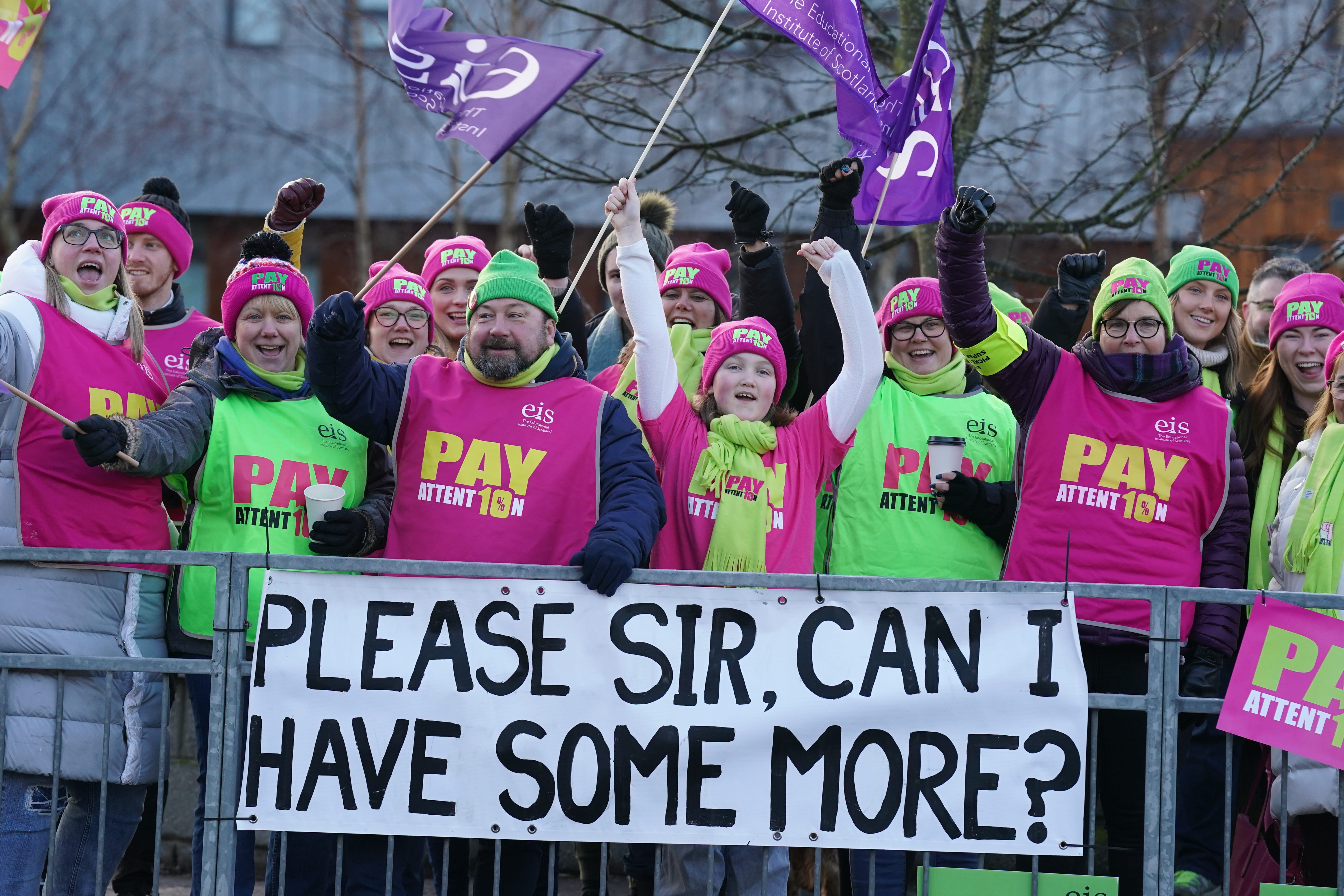Sturgeon appeals for ‘spirit of compromise’ to help resolve teachers’ strike
The First Minister said her Government would do ‘everything in our power’ to prevent strike action during this year’s exams.

Your support helps us to tell the story
From reproductive rights to climate change to Big Tech, The Independent is on the ground when the story is developing. Whether it's investigating the financials of Elon Musk's pro-Trump PAC or producing our latest documentary, 'The A Word', which shines a light on the American women fighting for reproductive rights, we know how important it is to parse out the facts from the messaging.
At such a critical moment in US history, we need reporters on the ground. Your donation allows us to keep sending journalists to speak to both sides of the story.
The Independent is trusted by Americans across the entire political spectrum. And unlike many other quality news outlets, we choose not to lock Americans out of our reporting and analysis with paywalls. We believe quality journalism should be available to everyone, paid for by those who can afford it.
Your support makes all the difference.Nicola Sturgeon has said her Government will do “everything in our power” to prevent teachers from striking during this year’s exams.
The First Minister said she hoped a deal could be reached to bring an end to the pay dispute which has seen schools closed by industrial action – but stressed achieving this would require “compromise” from all parties involved in pay talks.
She spoke amid an ongoing dispute over pay, which saw teachers first walk out in November last year.
And as the the EIS – Scotland’s largest teaching union – brought the latest phase of industrial action to a close, its general secretary Andrea Bradley insisted the only way to “absolutely” avoid any disruption to exams was for the Scottish Government to stump up additional cash.
Ms Bradley told PA Scotland that if the Scottish Government and council leaders in Cosla “wish to avoid any further disruption to children and young people’s learning, and if they wish to absolutely avoid any risk to the preparation for the exam diet, then, they have to do what is within their power and bring resource to the table that can be configured within a settlement that could be credibly considered by our members”,
She insisted: “That’s the way that we avoid any further disruption to education, and the risk of the exam diet being at all affected by the action that our members are being forced to take.”
The EIS general secretary, speaking from a picket line in Greenock, Inverclyde, said: “This pay claim will have been on the desks of the Scottish Government and Cosla for a year tomorrow.
“It was on their desks months before last year’s exam diet began, they’ve had 12 months to bring forward an acceptable resolution to this dispute and they haven’t yet done so.”
Ms Bradley spoke out as teachers in the Inverclyde and Shetland areas took part in strike action – with the final day of a 16-day programme of rolling regional strikes.
Teachers’ unions now plan two further national strike days, on February 28 and March 1, with further regional action set to take place after that.
The union’s strike action runs until until the middle of May, Ms Bradley added, vowing that the EIS “will be looking to renew that mandate should we need to”.
Ms Sturgeon stressed the Scottish Government’s “very strong desire” to reach a deal to end the strikes, with the First Minister adding that the prospect of disruption to exams “would concern me”.
I hope we will see the spirit of compromise that is necessary to reach a resolution to this dispute
Contingency arrangements are being made in case strikes take place during the exam diet, but Ms Sturgeon said: “I very much hope they are not necessary.
“We will do everything in our power to avoid any such need for contingency plans of that nature.”
She added: “I hope we will see the spirit of compromise that is necessary to reach a resolution to this dispute.”
Speaking at a press conference in Edinburgh, the First Minister said: “Nobody in Government, nobody in local authorities and, I am in no doubt, no teacher, will want to see further disruption to the education of young people.”
But she insisted any deal must be both fair and affordable.
Teachers have rejected a deal which would see most classroom staff receive a 5% pay increase, although the lowest earners would get a 6.85% pay hike.
Instead, the EIS is demanding a 10% increase, but Ms Sturgeon pointed out other local government workers had last year accepted a rise in line with the one being offered to teaching staff.
Pay deals have to be “fair to other public workforces, including the broader, local government, public sector workforce that has already accepted a pay increase that is the same as that offered to teachers”, she said.
Ms Sturgeon said: “We are genuine and sincere about seeking agreement, but it has to be agreement based on a settlement that is affordable and fair.
“That is what we are still seeking to achieve with the teaching unions, and I hope very much we are able to get there in the period ahead.”